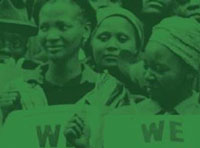More about the workshop
 The Perception of Apartheid in Western Europe, 1960-1990
The Perception of Apartheid in Western Europe, 1960-1990
The task of this workshop is to bring researchers together, who are working on the perception of the South African apartheid in Western Europe. This group contains of four PhD-students and their supervisors from Copenhagen, Hamburg and Berlin as well as other researchers from Denmark, Germany, Sweden and the UK, working on different aspects of this topic. It also includes other senior scholars, experienced in the history of transnational relationships as commentators.
The participants explore the poly-valences in the self-understanding of European societies in the second half of the 20th century in some exemplary fields of the postcolonial situation, focusing on the intensely debated Apartheid problem.
.... By connecting Western European countries’ transformation from industrial to post-industrial societies with the simultaneous “Shock of the Global”, starting already in the 1960s and peaking in the 1980s, their common goal is to understand how European societies adjusted to what they perceived as the challenge of ‘globalization’ at its early stage. The European countries reactions to the Apartheid regime varied significantly according to their particular historical relationship to South Africa, the current and on-going cultural and economic exchanges, their self-perception and sensitivity to internal and external pressure. Whereas the Scandinavian countries were the first to boycott the regime and to advocate strong sanctions at an international level, there was significant support for Apartheid for example in the United Kingdom and West Germany. A more detailed investigation of these disparate perceptions and reactions to Apartheid provides a reference point for highlighting similarities and differences between European societies along a path towards a global civil society. The projects in question address specific concerns relating to the development of post-industrial societies, such as the formation of a ‘moral economy’, the development in the political awareness of ‘consumer citizens’, and the expansion of national media environments into a global media society. Because it was so widely and intensely discussed, simultaneously developing from the early 1960s onward and peaking in the 1980s, Apartheid is a brilliant case for the analysis of the correlation between societal change and the impact of the global.
This workshop will establish and strengthen the co-operation of scholars from different European countries in this important field of research in contemporary European history.
